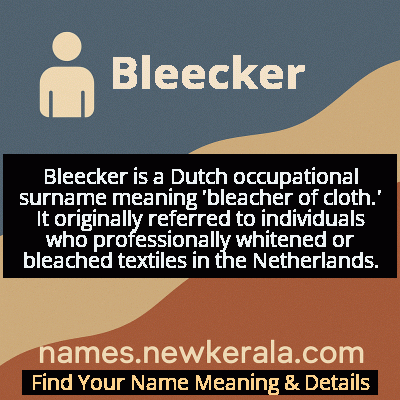Bleecker Name Meaning & Details
Origin, Popularity, Numerology Analysis & Name Meaning of Bleecker
Discover the origin, meaning, and cultural significance of the name BLEECKER. Delve into its historical roots and explore the lasting impact it has had on communities and traditions.
Name
Bleecker
Gender
Male
Origin
Dutch
Lucky Number
7
Meaning of the Name - Bleecker
Bleecker is a Dutch occupational surname meaning 'bleacher of cloth.' It originally referred to individuals who professionally whitened or bleached textiles in the Netherlands.
Bleecker - Complete Numerology Analysis
Your Numerology Number
Based on Pythagorean Numerology System
Ruling Planet
Neptune (Ketu)
Positive Nature
Intuitive, analytical, spiritual, and inquisitive.
Negative Traits
Secretive, reserved, aloof, and can be overly critical.
Lucky Colours
Green, yellow.
Lucky Days
Monday.
Lucky Stones
Cat’s eye, moonstone.
Harmony Numbers
1, 5, 6.
Best Suited Professions
Scientists, researchers, spiritual leaders, detectives.
What People Like About You
Depth of knowledge, analytical skills, spirituality.
Famous People Named Bleecker
Anthony Bleecker
Lawyer and Writer
Prominent New York lawyer and literary figure, friend of Washington Irving
James Bleecker
Merchant and Banker
Wealthy New York merchant who helped establish early American banking
Rutger Bleecker
Colonial Merchant
Early Dutch settler in Albany, New York who built significant trading business
Johannes Bleecker
Public Official
Served as mayor of Albany and represented Dutch colonial interests
Name Variations & International Equivalents
Click on blue names to explore their detailed meanings. Gray names with will be available soon.
Cultural & Historical Significance
The cultural significance extends beyond family history to encompass broader themes of immigration, adaptation, and cultural preservation. As Dutch settlers in America, the Bleeckers maintained their cultural identity while integrating into the developing American society. This dual identity reflects the larger story of ethnic groups in America preserving heritage while contributing to national development. The name's association with textile work also connects to industrialization and the evolution of crafts into modern industries. Today, Bleecker represents a bridge between Old World traditions and New World innovation, serving as a reminder of how occupational names preserve historical economic activities and social structures that shaped communities.
Extended Personality Analysis
Individuals bearing the name Bleecker are often perceived as practical, industrious, and detail-oriented, reflecting the name's occupational origins in textile bleaching. They tend to possess a strong work ethic and methodical approach to tasks, much like the careful process of cloth bleaching that requires precision and patience. These individuals often demonstrate reliability and consistency in their endeavors, with a grounded perspective that values tangible results over abstract concepts. Their practical nature is typically complemented by good organizational skills and the ability to see projects through from conception to completion, making them valuable in both professional and personal contexts.
Beyond these foundational traits, Bleeckers often exhibit qualities of transformation and refinement in their personalities. They tend to be individuals who can take raw ideas or situations and develop them into something more polished and effective. This transformative quality suggests adaptability and growth-oriented thinking. While they respect tradition and established methods, they're not afraid to innovate within structured frameworks. Their communication style is typically direct and clear, preferring substance over style. In relationships, they value loyalty and consistency, often serving as stable anchors for friends and family. The combination of practical diligence and transformative capability makes them particularly effective in careers that require both technical skill and creative problem-solving.
Modern Usage & Popularity
In contemporary times, Bleecker remains primarily a surname but has seen occasional use as a distinctive given name, particularly among families with Dutch heritage or those seeking unique, surname-style first names. The name maintains strong geographic associations with New York and the Hudson Valley region where the original Bleecker family settled. While not common in birth records, it appears in business names, particularly in the Northeast United States, and retains cultural cachet through its association with New York's Bleecker Street, which has become synonymous with indie music, fashion, and bohemian culture. The name appeals to parents looking for names with historical depth, occupational roots, and urban sophistication without being overly common. Its usage has remained relatively stable but niche, occasionally appearing in creative and artistic communities that value its distinctive sound and cultural connections. Recent trends show slight increases in its use as a middle name or in hyphenated combinations, reflecting the broader pattern of surname adoption as given names while maintaining its unique character.
Symbolic & Spiritual Meanings
Symbolically, Bleecker represents purification, transformation, and the refinement process. Just as bleaching transforms raw cloth into pristine white fabric, the name metaphorically suggests the ability to purify, clarify, and elevate. It symbolizes the journey from rough to refined, from potential to actualization. The name also carries connotations of light and brightness, both literally through the bleaching process that makes fabrics whiter and metaphorically through enlightenment and clarity. In a broader sense, Bleecker represents craftsmanship, the value of skilled labor, and the dignity of transforming raw materials into useful, beautiful products. It stands as a reminder of the importance of process and patience in achieving quality outcomes, making it symbolic of methodical excellence and the quiet satisfaction of work well done. The name further embodies the concept of legacy and continuity, connecting present to past through occupational traditions that shaped communities and economies.

